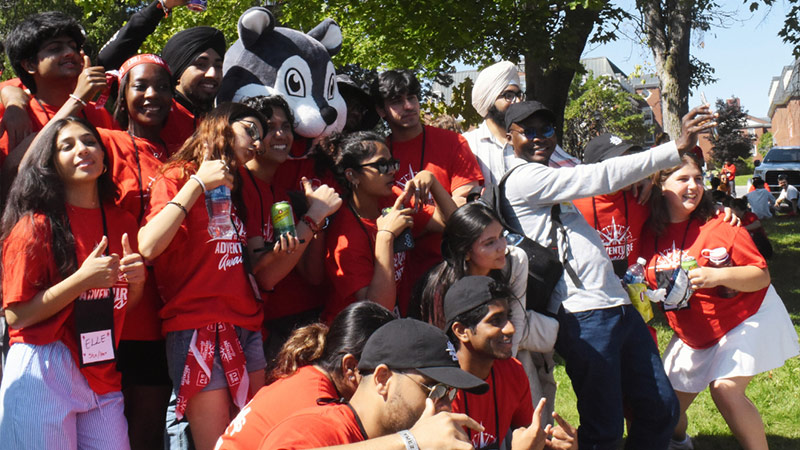Project Headstart helps international students carve paths in a new place
Author: Kayla Cormier
Posted on Sep 6, 2024
Category: UNB Saint John , UNB Fredericton

September brings a new academic year and an exciting time for students. For in-province or in-country students, there might be a week or two of preparation, picking courses, purchasing textbooks and gathering supplies.
However, for international students at the University of New Brunswick (UNB), there is much more planning involved, to say nothing of the significant social and cultural differences they face when they arrive.
Skylar Soh, a third-year student who moved to New Brunswick from Malaysia, found Project Headstart vital to her transition and, surprisingly, her safety.
“I attended a lot of online sessions while I was still in Malaysia,” she said. “One of the topics that sticks out in my mind is a session where they literally just taught us how to walk on ice,” she said.
“Being from Malaysia, where it’s summer year-round, I had never lived in a country with four seasons.
“In the sessions, they provided us with lots of tips on how to layer for winter. That really helped me in knowing how I should prepare. I’ve lived here for two years, and I’ve never fallen on ice!”
Project Headstart – formerly known as “pre-arrival sessions” – includes a series of virtual sessions where UNB’s International Student Advisor’s Office (ISAO) guides incoming students through the application and settlement process.
The application process for international students is lengthy and complex, said Hillary Nguyen, transition advisor in the ISAO. “It can cause a lot of stress and anxiety for incoming international students, something I’ve seen in my work countless times,” she said.
Session topics range from how to apply for a study permit and visa to how to apply for a phone plan and housing.
“Some of these topics are thought to be second nature, especially for locals, but they can be very difficult for incoming students who may not know cultural practices here or even the best places to go shopping for basic needs,” Nguyen.
“The sad truth is international students are more vulnerable to fraud. Project Headstart is one way we are trying to help with that.”
Soh said Project Headstart provided a list of grocery stores, tips on where to shop for necessities, and access to dietician services.
“When I arrived here, I didn’t know what to eat. I couldn’t find the ingredients that I wanted, and I started eating the same thing repeatedly for weeks.”
“Project Headstart helped me learn about different foods and where to shop for them. There’s a new Asian supermarket open, so I shop there a lot. It’s not the same as back home, but very similar,” she said.
Soh also appreciated that Project Headstart focused on the mental health and well-being of international students.
“They discuss how you can adapt to the culture and how to deal with homesickness,” she said. “I really liked that section. The ISAO provides resources for counselling if students are feeling homesick. I felt safer knowing that those services were there for me if I needed them.”
Soh was inspired by her experience and has just spent the summer working full-time as the summer program assistant in UNB’s Student Abroad office. She got this position after going through UNB’s work-study program, which she learned about through Project Headstart.
Sarah Raj Mandlekar is another third-year UNB student who moved to New Brunswick from Mumbai, India, to study at UNB. She said after two years, she feels she has found her place in her new community.
“I think Project Headstart’s biggest strength is that it doesn’t assume students know things,” Mandlekar said.
Mandlekar came to UNB in 2022 amid the pandemic.
“My high school was online, so the social interaction I had was with my family, and that’s it,” she said. “All the resources Project Headstart provided were very helpful and made me feel more comfortable to put myself out there.”
“I was able to come here and be open to new experiences and making friends and not be too scared of anything,” she said.
Since arriving at UNB, Mandlekar has volunteered for several clubs and societies. “It’s been a journey for me to find out where I fit in,” she said.
“Orientation was really big for me because it’s where I made my best friends,” she said.
“As an international student, community matters so much. If you don’t make friends in those initial days, you might not feel good enough to stay. You might not want to study. Your social environment dictates how you perform academically and elsewhere,” she said.
Mandlekar began working at the ISAO this summer, focusing on coordinating international student orientation. She said that Project Headstart and orientation are growing in scope and getting better each year.
“My wish is that all students will make a friend or two at orientation, so they can start university on the right foot.”
